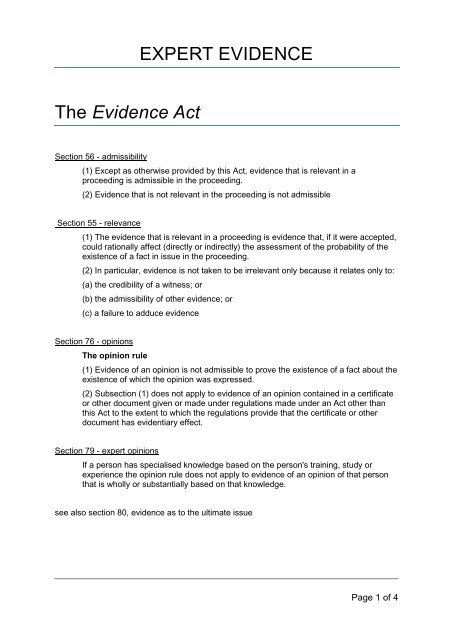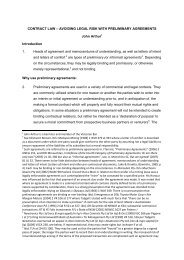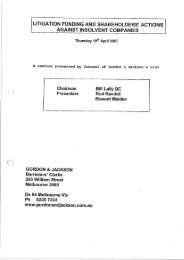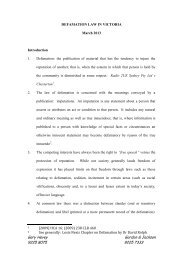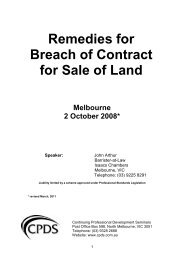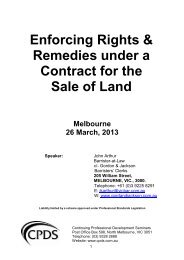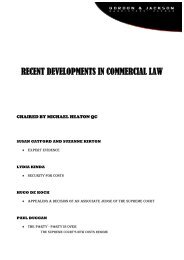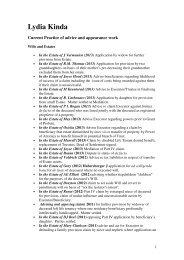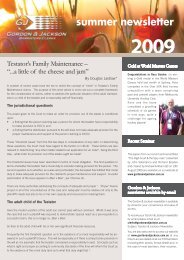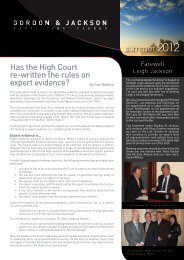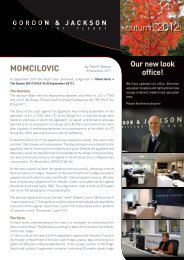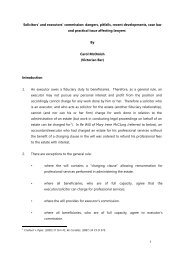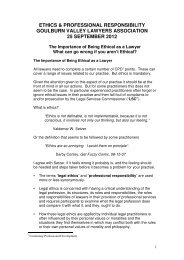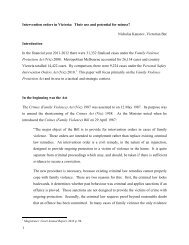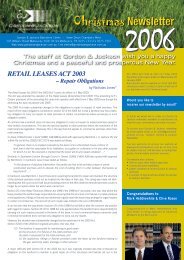The Evidence Act - Gordon & Jackson
The Evidence Act - Gordon & Jackson
The Evidence Act - Gordon & Jackson
You also want an ePaper? Increase the reach of your titles
YUMPU automatically turns print PDFs into web optimized ePapers that Google loves.
EXPERT EVIDENCE<br />
<strong>The</strong> <strong>Evidence</strong> <strong>Act</strong><br />
Section 56 - admissibility<br />
(1) Except as otherwise provided by this <strong>Act</strong>, evidence that is relevant in a<br />
proceeding is admissible in the proceeding.<br />
(2) <strong>Evidence</strong> that is not relevant in the proceeding is not admissible<br />
Section 55 - relevance<br />
(1) <strong>The</strong> evidence that is relevant in a proceeding is evidence that, if it were accepted,<br />
could rationally affect (directly or indirectly) the assessment of the probability of the<br />
existence of a fact in issue in the proceeding.<br />
(2) In particular, evidence is not taken to be irrelevant only because it relates only to:<br />
(a) the credibility of a witness; or<br />
(b) the admissibility of other evidence; or<br />
(c) a failure to adduce evidence<br />
Section 76 - opinions<br />
<strong>The</strong> opinion rule<br />
(1) <strong>Evidence</strong> of an opinion is not admissible to prove the existence of a fact about the<br />
existence of which the opinion was expressed.<br />
(2) Subsection (1) does not apply to evidence of an opinion contained in a certificate<br />
or other document given or made under regulations made under an <strong>Act</strong> other than<br />
this <strong>Act</strong> to the extent to which the regulations provide that the certificate or other<br />
document has evidentiary effect.<br />
Section 79 - expert opinions<br />
If a person has specialised knowledge based on the person's training, study or<br />
experience the opinion rule does not apply to evidence of an opinion of that person<br />
that is wholly or substantially based on that knowledge.<br />
see also section 80, evidence as to the ultimate issue<br />
Page 1 of 4
<strong>The</strong> common law<br />
Makita (Australia) Pty Ltd v Sprowles [2001] NSWCA 305; (2001) 52 NSWLR 705<br />
Heydon J's six requirements at [85]<br />
1. the opinion has to be on an area that the Court accepts is an area of specialised<br />
knowledge;<br />
2. the witness must demonstrate that by reason of specified training, study or<br />
experience they are an expert in that area;<br />
3. the opinion must be on matters within that area of expertise;<br />
4. the expert must state, and the party calling the expert must prove, the facts on which<br />
the expert opinion is based;<br />
5. if any facts relevant to the opinion are assumed they must be identified and proved in<br />
some other way; and<br />
6. the expert must explain how the opinion expressed was reached.<br />
Items 1, 2 and 3 reflect section 79. Items 4, 5 and 6 are not expressly found in section 79,<br />
but were assumed to operate in parallel with section 79 until recently.<br />
Dasreef Pty Ltd v Hawchar [2011] HCA 21; (2011) 277 ALR 611<br />
French CJ, Gummow, Hayne, Heydon, Crennan, Kiefel and Bell JJ (Heydon J dissenting)<br />
held that the common law rules 4, 5 and 6 above are not part of the test for admissibility of<br />
expert evidence in Australian courts: the criteria set out in section 79 of the <strong>Evidence</strong> <strong>Act</strong> are<br />
the sole determinants of admissibility.<br />
BUT see<br />
Dura (Australia) Constructions Pty Ltd v Hue Boutique Living Pty Ltd and others [2012] VSC<br />
99 at [86] - [98]<br />
Matthews v SPI Electricity Pty Ltd (Ruling No 9) [2012] VSC 340.<br />
Court Rules and Codes of Conduct<br />
Purposes: - to require early written disclosure<br />
- to require disclosure in a way that clearly reveals any admissibility issues<br />
- to emphasise to all concerned that the principal role of an expert is to assist<br />
the court in reaching a more reliable decision<br />
- to stress the need for experts to be independent<br />
Order 44 of the Supreme, County and Magistrates' Court Rules and Form 44A;<br />
Division 23.2 of Part 23 of the Federal Court Rules and Practice Note CM7<br />
Page 2 of 4
Division 15.2 of the Federal Magistrates Court Rules 2001<br />
VCAT Practice note PNVCAT 2<br />
see also sections 37M and 37N of the Federal Court of Australia <strong>Act</strong> 1976 (Clth) and<br />
sections 16-27 of the Civil Procedure <strong>Act</strong> 2010 (Vic)<br />
A regime of full disclosure by experts and a duty not to mislead by silence or omission.<br />
What's coming<br />
sections 65F-65Q of the Civil Procedure <strong>Act</strong> 2010 (Vic) as proposed by section 10 of the<br />
Civil Procedure Amendment <strong>Act</strong> 2012 currently before the house and due to come into<br />
operation on or before 1 May 2013<br />
Preparing expert evidence<br />
1. What do you need?<br />
<br />
what facts in issue cannot be proved with lay evidence?<br />
2. Where do you look?<br />
3. <strong>The</strong> retainer<br />
4. Expert evidence and client legal privilege<br />
<br />
sections 119, 122 and 126 of the <strong>Evidence</strong> <strong>Act</strong><br />
ASIC v Southcorp (2003) 46 ACSR 438<br />
Temwell v DKGR [2003] FCA 930, [2003] FCA 967, [2003] FCA 985<br />
Roads Corporation v Love [2010] VSC 253<br />
5. Keep your expert at arms length<br />
Day v Perisher Blue (2005) 62 NSWLR 731<br />
6. Defining the playing field: instructing your experts<br />
<br />
<br />
<br />
<br />
<br />
<br />
<br />
<br />
identify the parties and the dispute<br />
attach copies of all relevant documents (checking that no privileged material such as<br />
draft witness statements is disclosed)<br />
state any assumptions you want the expert to make (and ensure sure you can prove<br />
those assumptions)<br />
ask the expert to set out their relevant experience<br />
ask for an opinion - either generally or as a series of questions<br />
ask the expert to identify the documents on which the opinion is based<br />
give guidelines as to the form of the report you want<br />
attach the relevant code of conduct or Court Rules<br />
7. presenting expert evidence to the Court<br />
Page 3 of 4
Susan Gatford, Barrister<br />
Owen Dixon Chambers<br />
205 William Street<br />
Melbourne VIC 3000<br />
Telephone: +61 3 9225 7556<br />
Fax: +61 3 9225 6127<br />
Email: susangatford@vicbar.com.au<br />
Qualifications<br />
B.Sc. (Hons). University of Melbourne<br />
LL.B. Monash University<br />
LL.M. University of Melbourne<br />
Admitted to legal practice: 7 March 1994<br />
Signed the Victorian Bar Roll: 23 May 2002<br />
Nationally accredited mediator: 16 December 2011<br />
Susan practices in intellectual property and general commercial law.<br />
Following a science degree majoring in genetics and botany, Susan completed an LLB whilst working<br />
in a range of administrative and executive roles within various Victorian Courts and the Victorian<br />
Attorney-General's Department. She entered legal practice in 1994 with Jerrard & Stuk Lawyers, a<br />
boutique Melbourne CBD commercial law firm, becoming Partner, Intellectual Property and<br />
Information Technology in 1998. During her time with the firm, Susan completed a Master of Laws<br />
with a focus on intellectual property law. She also became a registered Trade Marks Attorney.<br />
Susan signed the bar roll in 2002. Her practice has been principally based in the Federal Courts of<br />
Australia in Melbourne, Sydney, Brisbane and Adelaide as well as the Commercial Court of the<br />
Supreme Court of Victoria. <strong>The</strong> majority of her work is in intellectual property but she also maintains a<br />
general commercial practice.<br />
Susan has conducted numerous trials both as sole counsel and with various Senior Counsel and also<br />
many hearings at IP Australia. A number of cases that have proceeded to hearing in which she has<br />
appeared as counsel are listed on her profile page at www.vicbar.com.au.<br />
In addition to trial and appellate appearances, Susan is experienced in advice work, drafting<br />
pleadings, appearing in interlocutory applications and at mediations. She recently gained national<br />
accreditation as a mediator.<br />
Page 4 of 4


